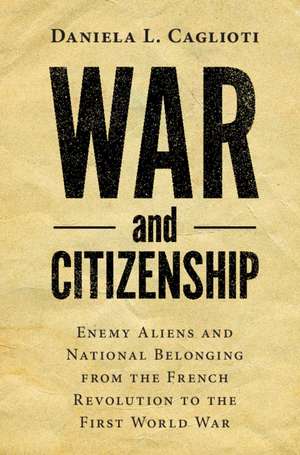War and Citizenship: Enemy Aliens and National Belonging from the French Revolution to the First World War: Human Rights in History
Autor Daniela L. Cagliotien Limba Engleză Hardback – 18 noi 2020
Din seria Human Rights in History
-
 Preț: 281.30 lei
Preț: 281.30 lei - 8%
 Preț: 564.42 lei
Preț: 564.42 lei -
 Preț: 184.88 lei
Preț: 184.88 lei -
 Preț: 232.45 lei
Preț: 232.45 lei -
 Preț: 230.10 lei
Preț: 230.10 lei -
 Preț: 230.61 lei
Preț: 230.61 lei -
 Preț: 310.51 lei
Preț: 310.51 lei -
 Preț: 286.30 lei
Preț: 286.30 lei -
 Preț: 312.46 lei
Preț: 312.46 lei -
 Preț: 255.09 lei
Preț: 255.09 lei -
 Preț: 201.76 lei
Preț: 201.76 lei -
 Preț: 276.61 lei
Preț: 276.61 lei -
 Preț: 232.24 lei
Preț: 232.24 lei -
 Preț: 232.73 lei
Preț: 232.73 lei - 9%
 Preț: 593.66 lei
Preț: 593.66 lei -
 Preț: 194.09 lei
Preț: 194.09 lei -
 Preț: 230.51 lei
Preț: 230.51 lei -
 Preț: 227.33 lei
Preț: 227.33 lei - 14%
 Preț: 895.53 lei
Preț: 895.53 lei - 11%
 Preț: 597.10 lei
Preț: 597.10 lei -
 Preț: 216.39 lei
Preț: 216.39 lei -
 Preț: 280.74 lei
Preț: 280.74 lei -
 Preț: 320.75 lei
Preț: 320.75 lei -
 Preț: 288.42 lei
Preț: 288.42 lei - 14%
 Preț: 757.85 lei
Preț: 757.85 lei - 11%
 Preț: 600.84 lei
Preț: 600.84 lei -
 Preț: 264.74 lei
Preț: 264.74 lei -
 Preț: 233.22 lei
Preț: 233.22 lei -
 Preț: 327.51 lei
Preț: 327.51 lei -
 Preț: 242.08 lei
Preț: 242.08 lei -
 Preț: 272.75 lei
Preț: 272.75 lei - 11%
 Preț: 537.58 lei
Preț: 537.58 lei -
 Preț: 288.25 lei
Preț: 288.25 lei - 14%
 Preț: 708.38 lei
Preț: 708.38 lei -
 Preț: 225.97 lei
Preț: 225.97 lei
Preț: 277.57 lei
Nou
Puncte Express: 416
Preț estimativ în valută:
53.11€ • 55.60$ • 43.95£
53.11€ • 55.60$ • 43.95£
Carte disponibilă
Livrare economică 17-31 martie
Livrare express 28 februarie-06 martie pentru 46.59 lei
Preluare comenzi: 021 569.72.76
Specificații
ISBN-13: 9781108489423
ISBN-10: 1108489427
Pagini: 466
Dimensiuni: 160 x 234 x 29 mm
Greutate: 0.82 kg
Editura: Cambridge University Press
Colecția Cambridge University Press
Seria Human Rights in History
Locul publicării:Cambridge, United Kingdom
ISBN-10: 1108489427
Pagini: 466
Dimensiuni: 160 x 234 x 29 mm
Greutate: 0.82 kg
Editura: Cambridge University Press
Colecția Cambridge University Press
Seria Human Rights in History
Locul publicării:Cambridge, United Kingdom
Cuprins
Introduction: Part I. Background: 1. The emergence of the enemy alien; 2. Enemy aliens and 'civilization' in warfare; 3. Citizens and aliens in peacetime; Part II. The First World War: 4. War, state of emergency and early measures (1914); 5. Targeting internal enemies and enemy aliens (1914); 6. Consolidating the policies (1915–1916); 7. Repression and the economic war (1915–1917); 8. Globalizing and radicalizing the policies on enemy aliens (1917–1918); 9. From citizens to enemy aliens (1914–1923); Part III. Aftermath: 10. The end of the war: enemy aliens and the war's legacies (1919–1927); 11. Conclusion: A prolonged state of emergency?; Works Cited; Index.
Recenzii
'This book is the only comparative study on enemy aliens in European history and a large step to its global history. This makes the study unique in the field and will be highly welcome to historians, legal scholars and people interested in the history of human rights.' Dieter Gosewinkel, WZB (Berlin Social Science Center), Center for Global Constitutionalism
'Caglioti's truly transnational study makes a case for the First World War as the moment when states needed to identify enemy from friend in order to control legal status, seize property, and wage war. She demonstrates that definitions of citizenship, nationality, and rights in 1914–1919 consolidated changes of the nineteenth century and created a blueprint for modern international law regarding nationality.' Tammy M. Proctor, Utah State University
'The result of years of meticulous archival research, this is surely the definitive study of the way states in World War I took away the rights of legal residents by labelling them 'enemy aliens'. Highly relevant for our time, when the chase for 'enemies within' is once more on in so many countries.' Erik-Jan Zürcher, Universiteit Leiden
'Caglioti's truly transnational study makes a case for the First World War as the moment when states needed to identify enemy from friend in order to control legal status, seize property, and wage war. She demonstrates that definitions of citizenship, nationality, and rights in 1914–1919 consolidated changes of the nineteenth century and created a blueprint for modern international law regarding nationality.' Tammy M. Proctor, Utah State University
'The result of years of meticulous archival research, this is surely the definitive study of the way states in World War I took away the rights of legal residents by labelling them 'enemy aliens'. Highly relevant for our time, when the chase for 'enemies within' is once more on in so many countries.' Erik-Jan Zürcher, Universiteit Leiden
Notă biografică
Descriere
Demonstrates how states at war redrew the boundaries between members and non-members, thus redefining belonging and the path to citizenship.
